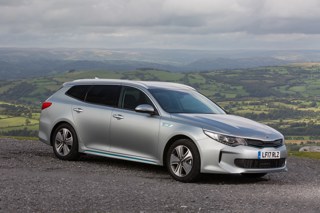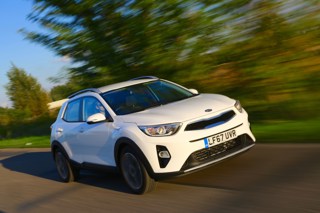Kia Motors (UK) has undertaken an extensive new study, interviewing 150 fleet managers nationwide for its 2017 Fleet Market Attitudes report.
The report uncovers current and future trends within fleet, with a focus on the rise in plug-in hybrid electric vehicles (PHEVs), pure electric vehicles (EVs), autonomy and technology, as well as how upcoming changes in policy are impacting fleet.
PHEV and EV technology is a very real consideration for the future of fleet. By 2022, fleet managers estimate one in three cars in their fleet will have PHEV/EV capabilities, and by 2027 will increase to one in every two cars.
Fleet managers who don’t currently have a PHEV/EV within their fleet, believe that they will do so within an average of four years.
Regarding the reasons behind delayed adoption, the majority (41%) feel that PHEVs/EVs look unprofessional, while 35% cite that the UK’s charging infrastructure is a barrier, with 27% believing that PHEVs/EVs are too expensive.
One in five (20%) felt that they did not yet understand enough about the technology, showing that more information across the industry is needed.
When looking at the UK’s charging infrastructure, more than one in two (55%) of all fleet managers agree that the UK’s charging infrastructure is not good enough to warrant fully investing into the technology at the moment.
Conversely, of those that are yet to adopt, they believe that the UK’s charging infrastructure will be better by 2021 – with battery life and charge time improving by the same date.
Of the fleet managers who have PHEVs/EVs within their fleet, the top reason was because they are good for the environment (67%), followed by an understanding that they are cheaper in the long run (67%) – at odds with fleet managers who don’t own a PHEV/EV who believe they are too expensive - and that the charging infrastructure is good in their area (58%). This is followed by four in ten (43%) who believe they are more attractive than regular cars and 41% who state that there is demand from employees to drive them.
Autonomy and Technology
According to the 2017 Fleet Market Attitudes report, the industry is also developed in terms of the inclusion of technology within cars. Notably, the average percentage of organisations where 'assisted driving' vehicles feature is 23%, with this anticipated to increase to 51% by 2027.
Similarly, the average percentage of organisations where ‘semi-autonomous driving’ vehicles feature is 19%, increasing to an average of 51% in ten years’ time.
When it comes to fully-autonomous vehicles, most fleet managers (93%) see challenges facing this type of driving. Identifying who is liable in the case of an insurance claim (56%) and the cost in updating roads and motorways so that they are compatible (47%) are cited as major concerns. In addition, around three quarters (76%) of respondents think that the greatest challenge facing fully-autonomous driving lies in changes to culture – with employees expected to work longer hours while commuting.
However, despite these barriers, many respondents believe that fully-autonomous vehicles offer significant benefits. The majority (74%) agree that these vehicles will result in fewer accidents on the road – potentially saving fleet costs and increasing road user safety, while 64 per cent believe that their fleet would be cheaper to maintain if it were fully-autonomous.
According to fleet managers, on average, their organisation’s fleet has had ten accidents within the last year. On average, such accidents cost each respondent’s organisation £472.72.
The level and cost of accidents each year represent significant areas of potential savings for organisations – particularly for the majority (74%) who view autonomous vehicles as having the potential to reduce accident numbers. Interestingly, the 2015 Fleet Market Attitudes report revealed the average was 14 accidents at a cost of £384.50 per accident, so while the number of accidents has dropped, the cost per accident has gone up.
Upcoming Changes in Policy
Based on the research UK fleets currently have an average of 126 cars, with a lifespan of three years. With organisations operating large fleets of nearly new vehicles, they are well placed to have the flexibility to adopt new technologies and powertrains in the vehicles that they select to make up their fleet.
From April 2018, the main rate threshold for capital allowances for business cars will be reduced to 110g/km. Over three quarters (77%) of respondents say that their organisation intends to change their fleet policy in 2018 to take this into account.
Currently, the average CO2 levels of organisations’ fleets is 118g/km, with only 27% being less than 110g/km.
However, a similar proportion state the average to be over 130g/km, while three in ten (30%) admit they don’t know – suggesting that emissions tax bands remain a concern, but are not necessarily a ‘deal-breaker’ for those who wish to purchase cars above the threshold.
The 2017 Fleet Market Attitudes report also revealed that two thirds (66%) of respondents admit that their organisation is nervous about purchasing a petrol or diesel car that isn’t a PHEV for their fleet. This follows the recent news in July 2017 that solely petrol and diesel cars may be banned from 2040.
John Hargreaves, head of fleet and remarketing at Kia, said: “As more and more organisations embrace new technologies for the vehicles in their fleets – from EVs/PHEVs to ‘assisted driving’ and ‘semi-automated driving’, traditional powertrains are becoming less likely to be considered the default option in fleet purchasing decisions.
“Organisations that can address and overcome the concerns they have with fully-autonomous driving technology stand to benefit greatly from its adoption.”
For further analysis of the findings from the 2017 Fleet Market Attitudes report, see the January 11 edition of Fleet News.




















Login to comment
Comments
No comments have been made yet.